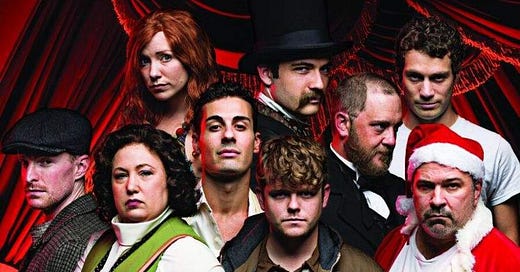When the next U.S. president takes office, the Stephen Sondheim/John Weidman musical Assassins will turn 35 years old. It’s a cult favorite but the musical that depicts America as a carnival of narcissistic murderers was never a big hit on Broadway. Even before Disney took over New York’s theatre district, crowds preferred spectacles about well-muscled dancers dressed as cats.
It remains, after all these years, my favorite musical, even though it gives a lot more weight to ideas than characters or stories. It’s a musical about the lies we Americans tell ourselves, our expectations from life and everybody’s need to feel important every now and then.
The Middlebrow has written about this show before and obviously recent events make it relevant, as happens every few years. Some have likened Tom Crooks, the man who took a shot at Donald Trump as more of a “school shooter” than a political actor. To me, it’s a questionable distinction as all acts of violence like this, even in war, are an attempt to use lifetaking force to exert power on society. That we even jokingly call guns “equalizers” is telling.
Besides, what Assassins tells us is that the people who have targeted presidents are only rarely political actors as we might understand them. The musical is book-ended by John Wilkes Booth and Lee Harvey Oswald. Indeed, Booth seduces Oswald into takin g his shot. But, of the two, Booth has the only clear political motive and even that is more about vengeance than, say, restoring the Confederacy. Booth doesn’t sing about what the country’s political system should be, he sings about Lincoln’s destruction of the South for what Booth deems an unworthy cause. Even so, throughout, the carnival barker host of the show speculates often that Booth is really angry that people don’t consider him a very good actor.
In Oswald, Sondheim and Weidman don’t speculate about conspiracies or Oswald’s flirtation with Russian communism. The real motive, they say, is to not be impotent. In the climaxing conversation between Booth and Oswald, Booth talks about Death of a Salesman and how Willy Loman’s wife demands that people pay attention to her husband’s plight, which is the plight of the typical American, trying to make a living and to find happiness in an uncaring society.
The most politically motivated assassin in the musical, Leon Czolgosz, was inspired by anarchist Emma Goldman to kill William McKinley. But even he seems more motivated by his hunger, poverty and lack of status than by the political or economic systems that caused those conditions in his life.
Charles J. Guiteau murdered James Garfield over a broken political promise, but it was about making Guiteau ambassador to France. Other assassins are famously out there trying to impress a teenage Jodie Foster or an imprisoned Charles Manson. What really comes through in the show is that these are all very personal acts by people raised with the notion that anything can happen in America, that if you work hard enough, you can be president and that everybody is important.
It’s really an explanation of the emerging influencer culture. What these assassins want is for their actions, opinions and even deaths to matter. Real political people don’t act this way. Real political people build organizations, put their causes before themselves and measure their progress over years, when they can measure it at all.
The coverage after the Crooks shooting was to try to find a motive, as if some badly punctuated Facebook rant from either political extreme would satisfy the public’s need for answers. Well, Assassins implies the answers are never satisfying and the public probably knows that.
In an era where news is entertainment and a way for people to keep score against their neighbors, what the media wanted was something that would let them say whether Crooks was an extremist from the right or the left. If from the right, then lefties would pay for the privilege of saying that the chickens had come home to roost. If from the left, the right would pay for evidence that it’s the liberals who are the true violent fascists.
Everybody not playing that game knows that the answer to Crooks’ motive is simple: this is probably the only time in his young life where anybody stopped to ask why he’d done anything. Attention must be paid.



I'm not at all familiar with this play, so thank you for this introduction to it. The connection between Death of a Salesman and our modern gun tragedies sounds like an excellent point for a story. I think I can see why you prefer this to the musicals that get top billing on the marquees.